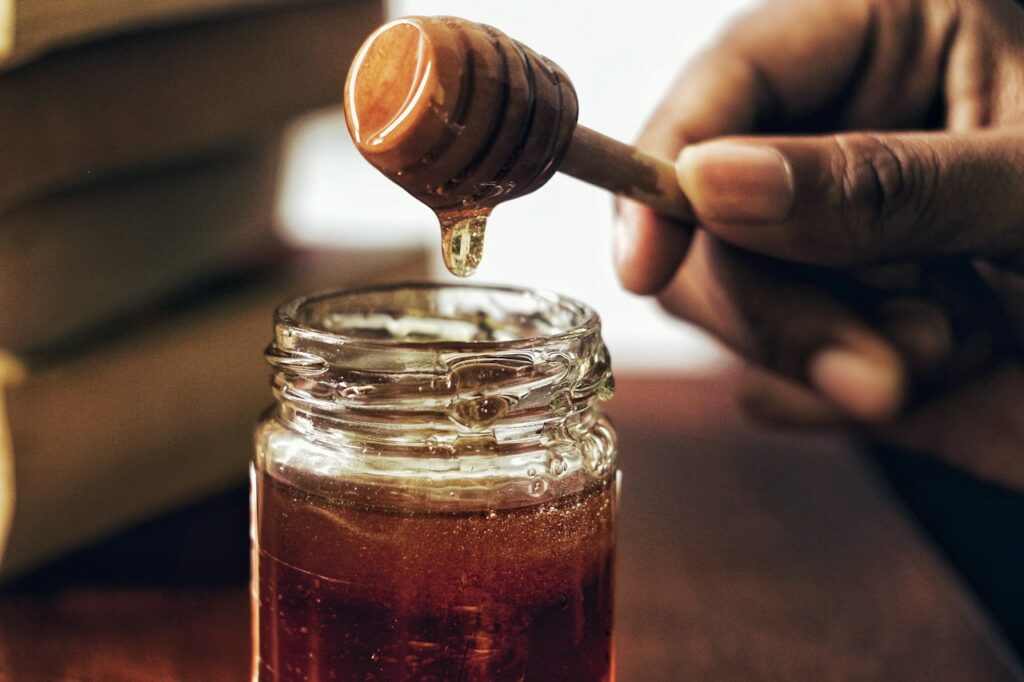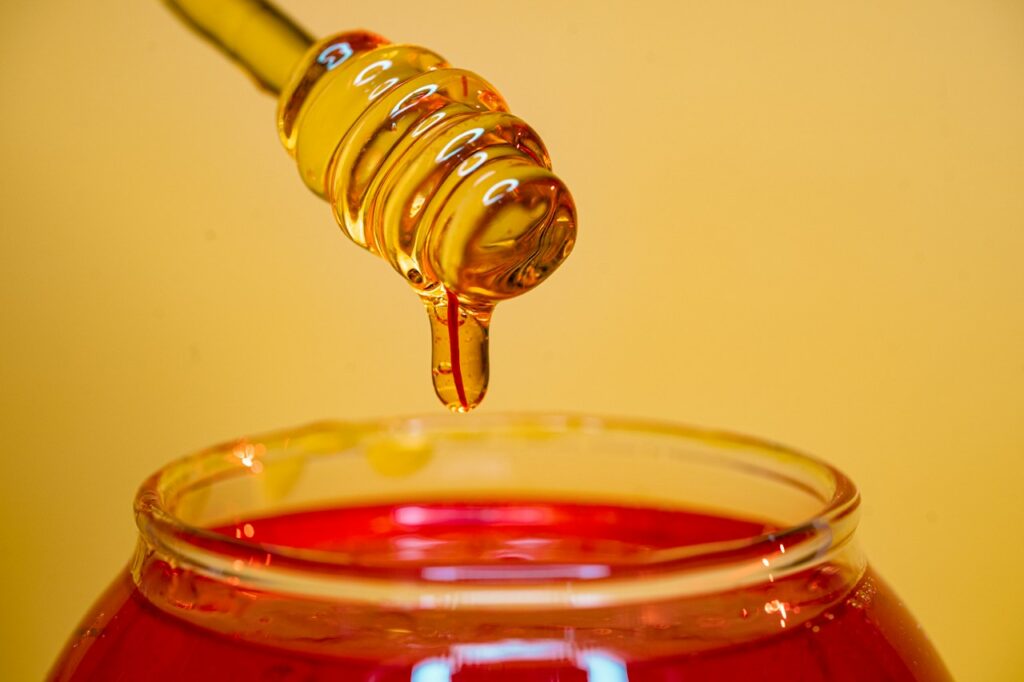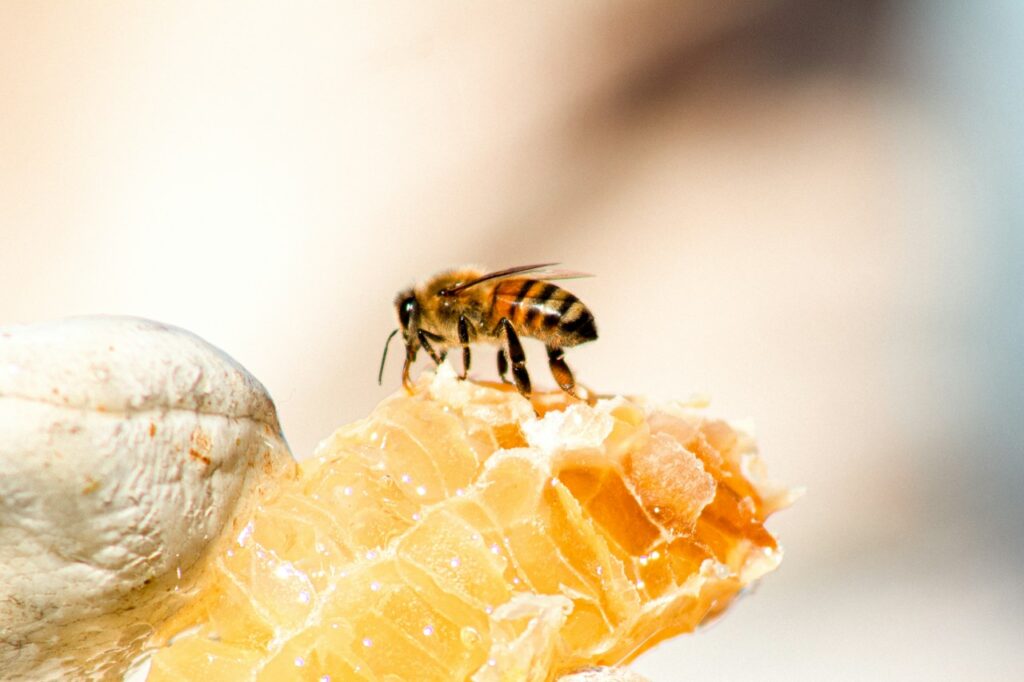Depending on where the bees collect, honey will vary in color and will present different beneficial properties for the human body. Can Dogs Eat Honey? Although it is not exclusive to humans, the benefits of honey are also great in dogs.

However, not all dogs can eat honey, and those who take it must do so in the right amount so that our dog does not feel bad or have negative effects on his health.
Let’s see how to give honey to a dog, what are its beneficial properties and what care we must take. Also, its different uses since mistakenly, not everyone uses it as a food or supplement.
Table of Contents
Related: Can dogs eat mulberries? 5 Mulberries’ Health Benefits for Dogs. Toxic Berries for Dogs
Can Dogs Eat Honey?
Honey as food
Honey is a product collected in the hives of bees of different species. These bees have been selected to produce much more than is necessary for their maintenance, so the collection of this does not affect their survival at all.
It is a product of which Spain is a great producer and whose consumption contributes to the maintenance of beekeeping and allows the pollination of many flowers year after year.
Its characteristics vary according to the pollinated flower, the time of year, and the species of bee used. In general, it is liquid, very dense, with a very sweet taste and colors ranging from light yellow to dark orange.
Benefits of honey for dogs
Nutritionally, honey is a saturated solution of simple carbohydrates that give it its sweet flavor. Its analytical composition is:
- 76.8% carbohydrates: All of these are sugars, mainly fructose, with a very sweet taste.
- 0.5% protein: Among which we can find group B vitamins.
- 17% water: This amount gives it that characteristic texture.
- Minerals: Among these are calcium, potassium, and sodium among others.
- Other components such as vitamin C.
It has a moderately high amount of calories, about 315 Kcal / 100g. Being a product rich in carbohydrates obtained from glucose, they quickly provide an extra level of energy to those who consume it.
The glycemic index that it has described is very low, this means that it is absorbed very slowly, so it will provide energy in a sustained way for a long time. In addition, due to its texture, it is more palatable than white sugar.
Honey stimulates the body’s immune system, making it more efficient against allergies and diseases. In addition, it has a large amount of glucose oxidase enzymes and natural antioxidants such as flavonoids.
In summary:
- Immediate extra energy supply
- Stimulation of the dog’s immune system
- Beneficial enzymes like glucose oxidase
- Provides antioxidants for the body such as flavonoids
- Rich in vitamins of group C and B, in addition to minerals

Possible harm of honey in dogs
Not all dogs are the same so not all tolerate the same foods in a beneficial way. The same happens with honey, not all dogs tolerate it and even in some, it is quite harmful.
Just as they can help to improve some allergies, having bee pollen remains can cause allergic reactions in dogs with nonspecific environmental allergies. These can also be very acute.
In animals with diabetes it is not recommended since, despite its slower absorption than sugar, it is still a very high amount of simple carbohydrates. However, in case of being treated with insulin and having a hypoglycemic crisis, honey can be tremendously useful to reverse it. This case is somewhat extreme and should not happen under normal conditions.
In overweight dogs it will not be recommended either since it is a very energetic food that favors a greater deposition of fat, further aggravating the problem. In dogs with infectious diarrhea it can also be counterproductive, since when it dissolves with saliva and intestinal secretions, it becomes a very accessible source of energy for the bacteria that cause the disease, causing abnormal fermentation (which is why it is not recommended to give it either to puppies).
Neither should the benefit of this product attributed to consumption in people be extrapolated, such as relief of a sore throat (administered with milk or lemon). If it is given alone it will not be harmful in this case, but when given as it is used in humans, with heat treatment and mixed with other products, the honeyed texture is lost, and with it its potential properties.
Related : Can dogs eat bacon? Is Bacon Bad for Dogs? How much bacon should a dog eat?
So avoid giving honey to dogs that:
- Have any kind of allergy
- Dogs that do not exercise or are overweight
- Dogs with diabetes or digestive problems
- Dogs with respiratory problems
How much honey should I give my dog?
We must start from the fact that honey is not a food for dogs, but a nutritional supplement for dogs that have a high energy drain or a small whim to give our dog from time to time. For adult dogs only, we should not give a puppy honey.
One hundred grams of honey (about five small tablespoons of coffee), contains eighty-five grams of carbohydrates, translatable to two hundred and sixty-seven calories. Although they seem low values to you, they are really high values for a dog (about a fifth of what a 30-kilo dog would eat a day).
Therefore, a healthy dog weighing around thirty kilos and with normal physical activity should not take more than a couple of small tablespoons per week. If it weighs fifteen kilos, half if it weighs seven kilos, a quarter, etc.
A healthy dog weighing about thirty kilos with high physical activity, like working dogs, search and rescue, etc … should not take more than two tablespoons a couple of times a week.
Obviously, as a supplement to your diet. Since we must continue feeding them with their usual diet (croquettes, BARF, etc …) Whatever the diet they have, it should never be mixed with honey, since it will be much more fermentable by microorganisms and it will be dangerous.
Using honey to heal wounds in your dog
We should not get carried away by the false information circulating on the Internet about the use of honey to heal wounds in dogs. Honey contains a low PH and a natural antibacterial effect, which is true, but it does not mean that it serves to heal wounds. This property is based on the low water activity of honey. It prevents bacteria from growing, which is why it is a product that, when properly packaged, never expires.
This has been used to heal wounds in very specific circumstances. Today it doesn’t make much sense because common disinfectants like povidone-iodine (Betadine) and chlorhexidine (Crystalline) are very cheap and effective.
Dogs love honey because it is sweet, if you apply honey to a wound, it will not stop licking it and it will even intensify your wound. In addition, many wounds require veterinary attention and if we try to fix them at home by applying honey, they can become infected and cause much more damage to the dog.
Can dogs eat honey peanut butter?
No, dogs cannot eat peanut butter or honey.
Dogs can consume peanut butter with honey if it doesn’t contain xylitol, which honey rarely does, so it’s best to avoid giving it to your dog.
Even if it does not contain xylitol, it is recommended that you only give your dog peanut butter honey in small amounts.
And sometimes their peanut butter contains xylitol too, so make sure there is no xylitol in the honey used, as well as the peanut butter used in honey peanut butter before you try to give it to your dog, otherwise, your dog could face serious consequences.
Can Dogs Eat Honey Melon?
Honeydew is a healthy treat that you can safely give your dogs, but like any other treat, you should only give it in moderation. Remember, treats should only make up about 10 percent of a dog’s daily diet, so if your pup eats two cups of food a day, he should only have about two ounces of treats.
Can dogs eat manuka, honey?
A type of honey made in New Zealand is called manuka honey. It is produced using Manuka tree nectar. Antibacterial and anti-inflammatory properties are present in manuka honey. Additionally, it contains a lot of enzymes.
It’s crucial to know how to administer Manuka honey to your dog safely if you’re thinking about doing so. We’ll give you some advice on how to administer Manuka honey to dogs down below.
• Mixing Manuka honey with your dog’s food is the best way to give him honey. It can be included in their wet or kibble food. For the honey to be properly incorporated if you are using dry food, you might need to add a little water to the mixture.
• Begin with a small dose of Manuka honey and gradually increase it over time. This will facilitate your dog’s acclimatization to the honey’s flavor and aroma.
• For your dog, always choose raw, unprocessed Manuka honey. Most nutrients and enzymes are present in this kind of honey.
• Keep Manuka honey in a cool, dark location only. Avoid placing it in the sun or close to a heat source.

Is honey good for dog allergies?
If you are a dog owner, you know that allergies are a common problem for many dogs.
While there are various medications and treatments available for allergies, some pet owners are turning to honey as a natural option. But does honey help dogs with allergies?
Some dog owners trust it, while others say it does nothing.
In this blog post, we’ll take a look. We’ll also explore some of the ways honey can help dogs with allergies and offer some tips on how to use honey as a treatment. Stay tuned!
References:
https://www.ncbi.nlm.nih.gov/pmc/articles/PMC3609166/
https://www.pumpkin.care/blog/can-dogs-eat-honey/
https://www.akc.org/expert-advice/nutrition/can-dogs-eat-honey/